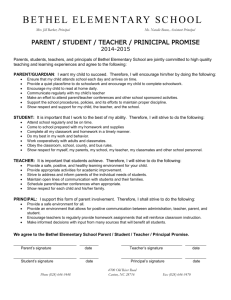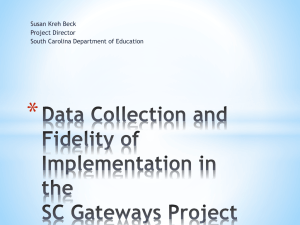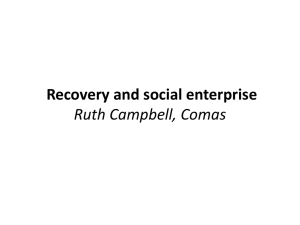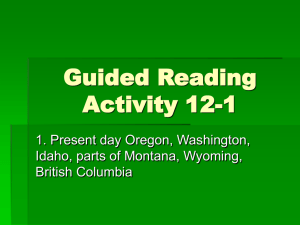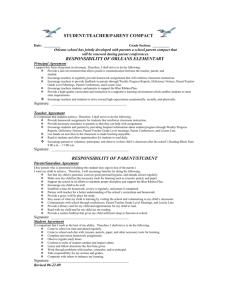Can Columbia Strive? - Columbia Public Schools
advertisement
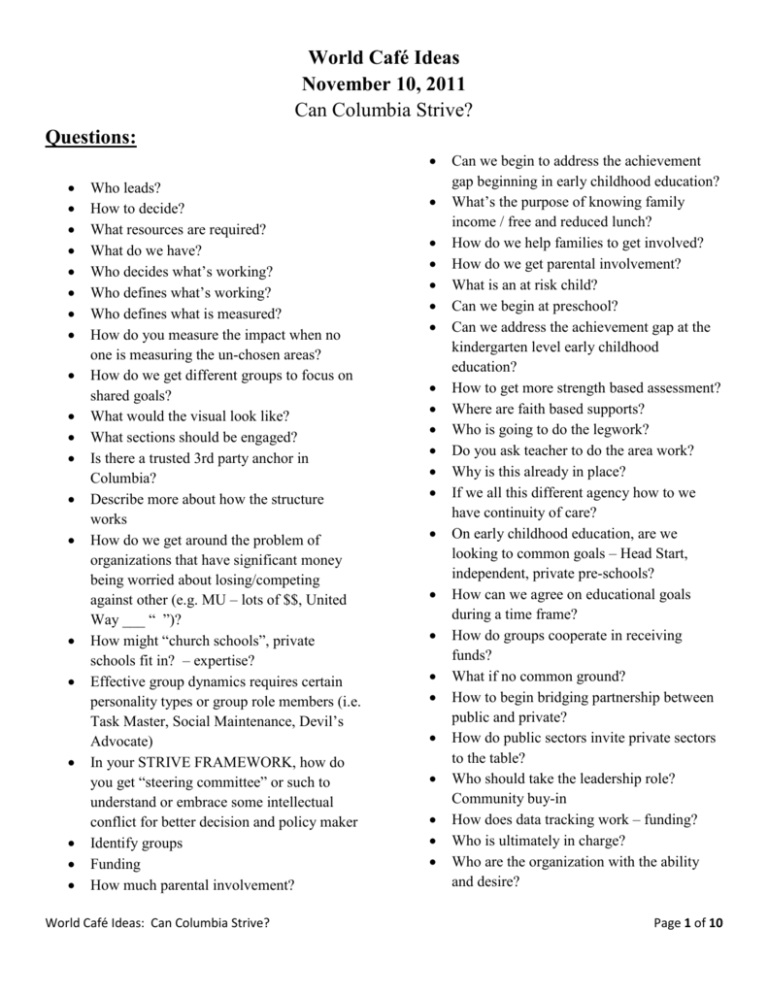
World Café Ideas November 10, 2011 Can Columbia Strive? Questions: Who leads? How to decide? What resources are required? What do we have? Who decides what’s working? Who defines what’s working? Who defines what is measured? How do you measure the impact when no one is measuring the un-chosen areas? How do we get different groups to focus on shared goals? What would the visual look like? What sections should be engaged? Is there a trusted 3rd party anchor in Columbia? Describe more about how the structure works How do we get around the problem of organizations that have significant money being worried about losing/competing against other (e.g. MU – lots of $$, United Way ___ “ ”)? How might “church schools”, private schools fit in? – expertise? Effective group dynamics requires certain personality types or group role members (i.e. Task Master, Social Maintenance, Devil’s Advocate) In your STRIVE FRAMEWORK, how do you get “steering committee” or such to understand or embrace some intellectual conflict for better decision and policy maker Identify groups Funding How much parental involvement? World Café Ideas: Can Columbia Strive? Can we begin to address the achievement gap beginning in early childhood education? What’s the purpose of knowing family income / free and reduced lunch? How do we help families to get involved? How do we get parental involvement? What is an at risk child? Can we begin at preschool? Can we address the achievement gap at the kindergarten level early childhood education? How to get more strength based assessment? Where are faith based supports? Who is going to do the legwork? Do you ask teacher to do the area work? Why is this already in place? If we all this different agency how to we have continuity of care? On early childhood education, are we looking to common goals – Head Start, independent, private pre-schools? How can we agree on educational goals during a time frame? How do groups cooperate in receiving funds? What if no common ground? How to begin bridging partnership between public and private? How do public sectors invite private sectors to the table? Who should take the leadership role? Community buy-in How does data tracking work – funding? Who is ultimately in charge? Who are the organization with the ability and desire? Page 1 of 10 How do we engage the small private institutions? Who can this umbrella organization be? Engaging private/home based facilities Who should take leadership role and how to identify group that has standing / influence in community? How do we engage private institutions? Who are public players and how do we get them to the table? Who and how do we identify leader / umbrella organizations? How do you get everyone ok with shared info on database? Who are the organizations? How do we engage private interests? Who should take the leadership role (umbrella organization)? How do you get social services involved? This (STRIVE) has been what’s needed for so long – gives a framework for what’s been missing A focus on the process and organizing Asking programs what would we like to measure – very refreshing (and opposite of how it’s normally done) Common measurements fantastic – then you can have structure Great to have expectations that you can obtain – goals have to be measurable, sustainable, and financially viable How can be educate parents in the lowerincome communities in efforts to create motivating, positive, and constructive atmosphere of learning? Reading proficiency, math literacy – how can elementary teachers be better suited to promote high levels of learning? Does the city want minority kids to succeed? Who is needed? What resources are needed? World Café Ideas: Can Columbia Strive? Don’t call yourself STRIVE – Portland All Hands Raised – It’s a movement Getting parental involvement God and churches back in the schools School will take all the responsibility for schooling 8:00 a.m. – 4:00 p.m. Teacher has responsibility to teach right/wrong ethics Do we have a shared community vision? We think we do but, we are still the 1,000 points of light Do we need to redefine the role of the teacher? Responsibility of more than academic instructor How are parents included in this shared vision, voices heard? Where is the money coming from for the infrastructure? Who will have to pay of it? How to pay for these programs? How to pay for it? Where does money come from? How can we as a community help our students achieve as a productive citizen? How can we motivate? Definition of what a leader is How can we as a community help our students achieve as a great person? How will leaders communicate? How do we as a community help our students achieve? o As a productive citizen o A whole person How do we motive? Gain momentum What is a leader How can we help students achieve as a whole person? How will leaders get together to make these decisions? What is our definition of a “leader”? Page 2 of 10 How can we as a community help our students achieve as a productive citizen? How will leaders get together and communication to each other? How can we help parents understand and build on the learning of others? Will we begin experiencing community fatigue? The community is not represented here, necessarily. Do the executives assembled here really speak for the common man? What is our vision? I like Cradle to Career. Who will lead it? How can parents set up structures that help children at an early age? How can we involve parents? How do you decide who needs the STRIVE movement? How do you get resources? Do we have the resources? Who decides/defines what’s working? Who defines what is measured? What do you do about people who won’t play? Lead? How do you decide? What resources does it take? What do we already have? How do we decide what’s working? Who defines what is measured? People who won’t play or align? Who leads or how do you decide who leads? What resources does it take; what resources do we have? Who decides what’s working? Who defines what it means to be working? Who defines what’s measured? What do you do with people who won’t play? What businesses are we going to bring in for expertise? How do you decide who leads? World Café Ideas: Can Columbia Strive? What resources do we already have? What’s currently working? Who decides what’s working? Who defines what is measured? How do you engage clients of services in a meaningful way? How can we get people outside of this room to see the value? What kind of support and technical assistance? Roadmap helpful for STRIVE Where does Columbia compare with starting data with communities that have used STRIVE? How can we use what other communities have done? How can we identify one child? How difficult to get everyone to agree on goals and metrics? Who would be in charge? Who are they key stakeholders? Who decides who the stakeholders are and how? Where do you start? How do you reach the community; the different players? How do you get their buy-in? Are there any start-up costs? How do we engage private institutions? Who should take the leadership role? Influencing community. Get the ball rolling. Legality of database How do we inform the community? Who monitors system? Who’s funding it? Who defines timeline and milestones? Gain understanding of process Where to start? How to determine the leaders of the group? What will the group focus on? How to identify stakeholders? Page 3 of 10 Voters need to understand what we are doing Make senses Is there a correspondence with poverty and economy? What do we need to do to develop the database platform? Are transitions ranked for importance? How do we prioritize resources? Is it too big of an idea to be feasible with so many leaders and ideas? How to work with agencies that already have goals in place in order to meet our goals? Are we getting the feedback from low income/poverty families? Do we have a fair representation? How to prevent bullying other children in schools thinking they are better than others? How do you help people go through a divorce? How do you help single parents? How is the best way to get names of organizations that are involved with educating parents? (United Way…..) How to use arts in educating parents to put children’s needs first? Literacy – ability to read, write, communicate Should we have magnet high schools? Or create a track or paths? Is it happening? How do we create a green and education zone in Douglass Park and Ridgeway neighborhoods? How do we start a food truck class at Douglass H.S.? How do we create an urban teacher program at Douglass? Training urban teachers in high schools? How do we create a community studies program at Douglass/Hickman? World Café Ideas: Can Columbia Strive? Can Columbia do something like this? How do you share with others? How do you implement? Can the programs that work at one school be shared with other schools? How would we get all the pre-schools, etc. involved – embracing – getting connected with private and public child caretakers? How to identify key players? How do we lead this effort? What would the organization look like? Getting things coordinated, neutral person assigned role Excited – embraceable – doable How do we energize the business community? How do we convey this message? How long would the process to get everything in place? Can we start now? 3M, IBM workforce – how would these look and work in our community? How do we get the common people (who we need most) involved? What measures are used by all organizations? Which leaders need to be at the table? How do we get a shared vision? How to measure? Who do you need at the table? o Leadership engaged. Identify shared vision Barriers: What about the things that are no longer measured – what happens to them – could this be a concern? People’s attachment to what they are doing Page 4 of 10 Identifying key organizations and assembling them Getting everyone to play nicely together and agree on common agenda Can we identify a good convener / neutral facilitator? United Way & other funders Engaging people at the grassroots level Stop labeling students – HUGH BARRIER Current means of assessment. Get new wholistic assessment. Parents don’t know as much as children in basics We don’t have spirituality in schools Stop thinking and labeling – Free and reduced cost lunch recipients as living in poverty Biases / if known – child internalizing (poor kid) Current evaluation / assessment – strength based on assessment Spirituality? What other community organizations could be a part, i.e., church, etc. Blaming each other Minority students are How teacher react to conflicts Labeling as poverty Home structure does not support education Not enough involvement from community based organizations Lack of parent involvement Racism Maybe it doesn’t happen – may be overwhelming Lack of knowledge Child care Transportation Resistant Expectations based on funding World Café Ideas: Can Columbia Strive? Hesitation to work with public schools because of increased funding for public schools Private working with public (funding oriented) Absences of taxes from largest business – university Getting Funding Confidentiality of information Transitory population Mobility Everyone realizing it is a community Funding Understanding this as a community issue Funding Convincing people / parents to access the services Growing transient population Communication with community – how can get word out It’s a community issue Different variations on measurements (common measures) Most people have blinders on – having a collective focus is great (you need to give up “I” in the collective) Study, study, study – afraid to implement the recommendations of studies – great to have steps Parents lack of education, motivation Absence of positive presence Teachers stuck in their ways “old dogs – new tricks” Lack of professional development programs o Absence of accountability for performance – teacher and student Leadership issues o Inconsistent vision o Divided motivations Cultural Page 5 of 10 Values Motivation Turf battles Not in my backyard Awareness Communication We need to work on African American unity How do we get parental involvement up We lack coordination – the next steps on the framework (engaged leadership, partnership, accountability structure, communicators and engagement) Collaborative action – how do we ensure that all players are engaged and involved? Example of YC2 21st Century grant not including all programs Resources Independent facilitator – ego How do we bring in distant parents – how you build community alone How do we all get along Collaboration Funding this investment Charge is hard, how do we all work towards the same goals Resources Resources Egos Distractions Lack of diverse communication Leader communication Large student body Bad decisions Lack of communication Communication of social services Large student body Distractions Communications Motivation Large classrooms Distractions World Café Ideas: Can Columbia Strive? Lack of communication – diverse Social services do not communicate with each other regarding the family of which that child is a part of Large classroom sizes Distractions Communications – diverse communication Larger classrooms People may not be able to continue to participate Every day people are not always engaged. How do you involve all stakeholders? We have good organizations, but competition for funds and attention create barriers We don’t focus on who is best suited to lead. If you’re the best cook, then you should cook. Funding is difficult to find Inspiring parents in difficult areas Timeline for consensus building Getting people to see they all have a role – how to let go of ownership Community fatigue – needs to be simplified Common vocabulary needed Building consensus Turf issues Place for everyone? Role to lead Community Fatigue The length of time needed for consensus building Turf issues Naysayers Helping people see that there is a place for everyone at the table Community fatigue – too many efforts Language/terminology Length of time Turf issues Language – common Page 6 of 10 Transient community; ability to track children Getting organizations to have same goals Time Resources Budget Funding for multiple scopes of work Many silos How do you implement collective impact Wanting instant causes results Community understanding in order to have buy-in Convincing that it’s everybody’s problem $$ 3 initiatives – CPS, UW, City Economic situation – 43% Free & Reduced Lunch Home environment School policies protecting data confidentiality Not to work in silos Competitive funding structure United Way / City / CPS – combine efforts – measurements How do you benchmark prior to kindergarten? Getting all groups to the talks Will daycare/childcare centers participate? With so many successful programs, how do you get everyone to buy into this specific program? Data gathering in one specific format Egos: individuals who have started successful programs Money Parents that do not want to get involved – school participation I went through the divorce Be there for them as much as you can Basics to feel love World Café Ideas: Can Columbia Strive? Parents that do not want to get involved in their child’s life (or can’t because of jobs) Love/hate relationships at home Low income areas, crime, stigma within Columbia, property value, minority population, urban care No barriers Need an inexpensive step van Finding out resources outside of CPS Lack of community interest Discrepancy between the elementary schools. Some teachers at the poverty schools are trained better – to handle different behaviors. Inconsistent training of teachers Learning to work together, share or give up your turf (duplications) Being willing / effective to engage parents Bridging the private and public sectors Agencies have their pet projects that might keep their priorities from getting on board Lack of a common vision Lack of agreement on the common measures or goals Getting the community and businesses involved Organizations have their current programs to work on How to determine the “one” to use for measuring consistently Silos, turf, too many people in order to obtain agreement on areas Each group may want their own goals Be consistent throughout the district and keep measures on each child that can follow them to each grade and school. A tracker for each kid. Tracking kids across schools Community to community mobility Page 7 of 10 Next Steps: Start partnership table Need a name for our process / effort [i.e. not STRIVE] Remove stereotypes Make the playing field level Playing field even Expectations same for everyone Trends – outcomes – always surrounding this = how to get help + progress Get identity = movement Identify assets What are gaps to increase assessments What our report card = what outcomes How to create bridge between private and public Have to get collectible data “Don’t let perfect be the end of good” Perception vs. Reality Extra money Get the information out there Mare parent involvement Partnership Going meet the business Ask common data collection Finding pockets of funds and resources and channeling it Determine the leaders Inventory of resources Establishing leadership Inventory of community resources o Who has tech o Who has money o Who had expertise Visualization matters for collective vision Next steps – where do you want to go – common goals in community Awesome to have steps, reflection, action, learning World Café Ideas: Can Columbia Strive? Community outreach Parent teacher communication – more often, consistent communication Parent incentives? Parent group based in the community – meetings at parent houses, common areas Teacher collaboration groups outside of their school and department ‘Diversity infusion’ – bringing different ideas to the table in a “World Café” format ‘Listen to teachers’ – hear their voice and support – then redirect Same approach – same outcome Different…. – desired …… Common goals Knowing resources Focus on existing working groups YC2 How do you move children from cradle to career? Time to capture the whole child Checks and balance Testimonials Showcase skills (collaboration) Checks and balances Maintain communication Checks and balances Equal representation Motivational speakers Social services united and communicated through a database Checks and balances for leaders Leaders need to represent each culture / ethnicity Motivational speakers / testimonials Sharing and feedback Checks and balances for leaders Identifying key partners Figuring out what is being done well Alight common outcomes – work together to achieve those before creating new ones? Creating visuals – need indicators first? Identifying funding Page 8 of 10 o What’s available o What’s needed o Future commitment ID key partners (done well) Common outcomes – what are you measuring? Buy – in Visuals ID resources for funding and sustainability Identifying key partners Inventory what’s being done well Inventory what outcomes are being measured now Large scale buy-in from community Identifying investment and sustainability Look at what the data says! Data analyst at University of Missouri take advantage of MU researchers Identify partners What is being done well? Buy-in from community Identify funding Identify who is willing to come to the table Everyone needs to be invited Active participation and commitment Combine initiative and measurements Changing school policies regarding sharing data Getting group collaboration around issue Leverage resources Develop common vision Identify champions Need a big buy-in from city/county/university Language is basis of literacy Reach out to families Define the goals of the program Organize the data – modify the data Different approaches to same issue Leadership – finding the right person to lead community World Café Ideas: Can Columbia Strive? We need no parent involvement at schools Talk to parents and get them involved in the school education Making sure all the kids are treated equal and no favorites Try work together to prevent a divorce Be what you can and not what you can’t Talk to parents about how important it is to get their basics met Pray for love and peace Spray and pray Promote young teachers/families etc. moving down there Partner with housing grants houses to move in Have teachers teach in ASP / schools Eryca Neville, Kelly Anderson, Kerry Anderson Start Food Truck class Create collaboration to support class? Sharing the program of the schools to the community – How to share the info. Meeting with stakeholders Parent education networks Road map Getting churches involved focused on same goal Getting message out Getting existing community group to embrace the vision and involved in tutor, etc. Mode of communication of common vision. Web-site, video streaming, TV Working group Grants (or materials) for pre-school inservices Rally student involvement College research leg work Truman school public policy, political science learning, class credit Get a name (besides STRIVE) Page 9 of 10 Get an organization an identity, identify exiting assets and corresponding gaps Identify asset steps to fill in the GAPS Build on your strengths It is all about the data and using the data to identify divers and groups to focus on Keep with the learn how to get better data, focus on reality and using the data to focus on progress Have businesses bring expertise and not just their money Creating a consistent measure that tracks a wide variety of information and agreeing upon that information and what to use World Café Ideas: Can Columbia Strive? Page 10 of 10
